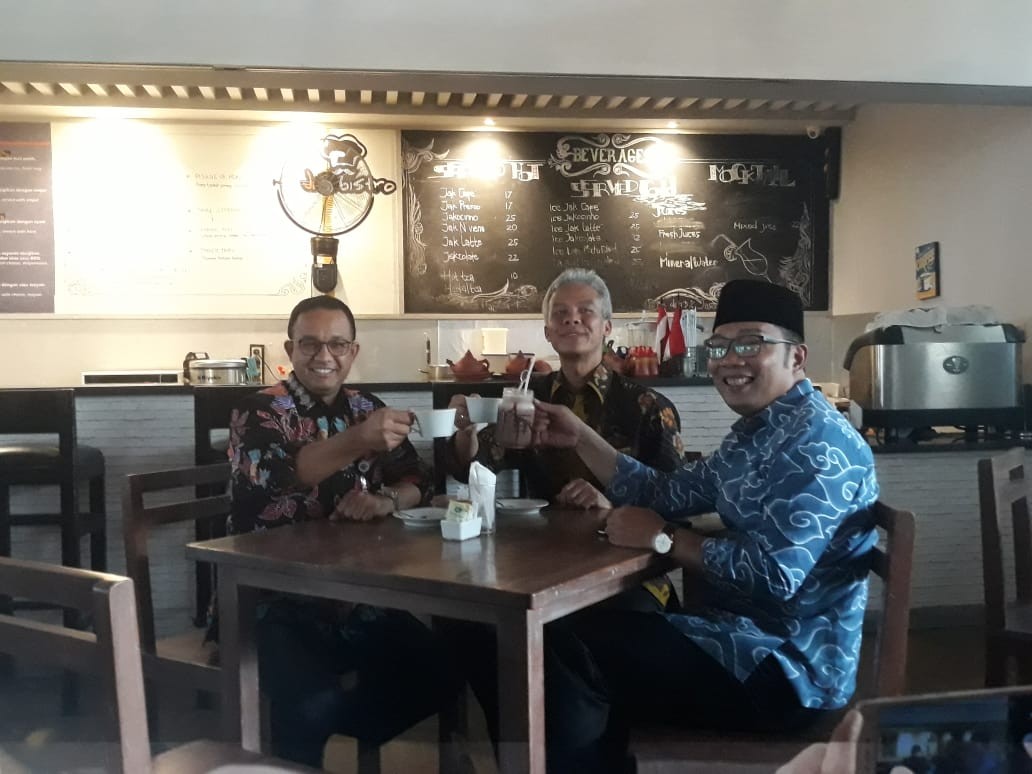Popular Reads
Top Results
Can't find what you're looking for?
View all search resultsPopular Reads
Top Results
Can't find what you're looking for?
View all search resultsElectability of governors Ganjar, Ridwan rises amid COVID-19's 'electoral incentives': Survey
The electability ratings of Central Java Governor Ganjar Pranowo and West Java Governor Ridwan Kamil increased by 2.7 percent and 3.9 percent in a May survey, respectively, compared to a similar survey conducted by Indikator Politik Indonesia in February.
Change text size
Gift Premium Articles
to Anyone
Central Java Governor Ganjar Pranowo and West Java Governor Ridwan Kamil are trending upward as potential candidates for the 2024 presidential race, according to the latest published poll, which shows their electability ratings as having risen in recent months.
The survey, commissioned by pollster Indikator Politik Indonesia and conducted through phone calls from May 16 to 18, revealed that 11.8 percent of the 181,200 respondents polled from across the country said they would vote for Ganjar if the election were held now, while 7.7 percent said they would vote for Ridwan.
The electability ratings of Ganjar and Ridwan increased by 2.7 percent and 3.9 percent in the May survey, respectively, compared to a similar survey conducted by the pollster in February.
At least three others, namely Defense Minister Prabowo Subianto, Jakarta Governor Anies Baswedan and Gerindra Party executive Sandiaga Uno, saw their electability drop in the latest poll, though they were still listed among the top five most electable candidates – alongside the two governors – for the 2024 presidential race.
“The 2024 race will be more competitive,” the pollster's executive director, Burhanuddin Muhtadi, told The Jakarta Post on Tuesday, noting that no one was currently dominating the headlines.
Indikator Politik Indonesia's survey in February show Prabowo, the erstwhile rival of President Joko "Jokowi" Widodo in the 2019 presidential race, with a strong lead among the top potential candidates with an electability of 22.2 percent. However, the Gerindra chairman only garnered 14.1 percent of the vote in the May survey.
Anies saw his electability rating go down from 12.1 percent in February to 10.4 percent in May, while Sandiaga, formerly Prabowo's running mate in the 2019 race, garnered only 6 percent of the vote in May compared to the 9.5 percent he got in February.
Burhanuddin said regional leaders had more “electoral incentives” amid the COVID-19 pandemic over the past two months as they could show off their policies on managing the health crisis, which subsequently affected politics at a national scale.
"Regional figures who lead big populations could use the opportunity as an electoral incentive because they could appear more often in the media, as the only issue that is in the public eye right now is COVID-19,” he said.
He said the phenomenon also explained Prabowo's electability drop. "His position as defense minister doesn’t give him direct control over COVID-19 handling.”
Read also: Prabowo keeps a low profile, Gerindra simmers in uneasy alliance with Jokowi
Ganjar and Ridwan are among the regional leaders who have been in the spotlight over their COVID-19 policies.
In Central Java, for instance, Ganjar prepared a Heroes Cemetery to bury medical workers who died after handling COVID-19 patients as some locals were opposed to their bodies being buried near their homes. He also distributed aid packages to residents of Central Java who were currently residing in Greater Jakarta because they could not return home due to a mudik (exodus) ban and introduced a community movement program to manage food and security in response to the pandemic in the province.
Ridwan conducted massive COVID-19 rapid testing and random swab test sampling on commuter lines and at markets in West Java. He also criticized a number of the central government's policies, questioning the validity of its COVID-19 data and its decision to raise Health Care and Social Security Agency (BPJS Kesehatan) premiums.
In the case of Anies, Burhanuddin said that one of the challenges he faced was that Jokowi's voters in the 2019 election were apparently still reluctant to support him due to disharmony between the two, which may be good news for the other potential candidates.
"Jokowi's supporters think of Anies as the challenger to the central administration or Jokowi's policy and vice versa. That’s why the votes of Jokowi supporters are split between Ganjar and Ridwan,” he said, suggesting that Anies would benefit from working on appealing to voters from outside the capital.
Responding to the survey, Hendrawan Supratikno of the ruling Indonesian Democratic Party of Struggle (PDI-P) said discussions on it were still too early because its results would change.
He said the PDI-P had prepared 20 possible presidential and vice-presidential candidates of various backgrounds and political parties. “We take the survey as a note," Hendrawan said.
Ganjar, a PDI-P politician, said on Tuesday that it would be up to the party over whether it would nominate him as a candidate, adding that he did not want to think about the race yet considering the current situation.
“We will still face the excesses of the [pandemic]; for example, its social and economic aspects," he said.










